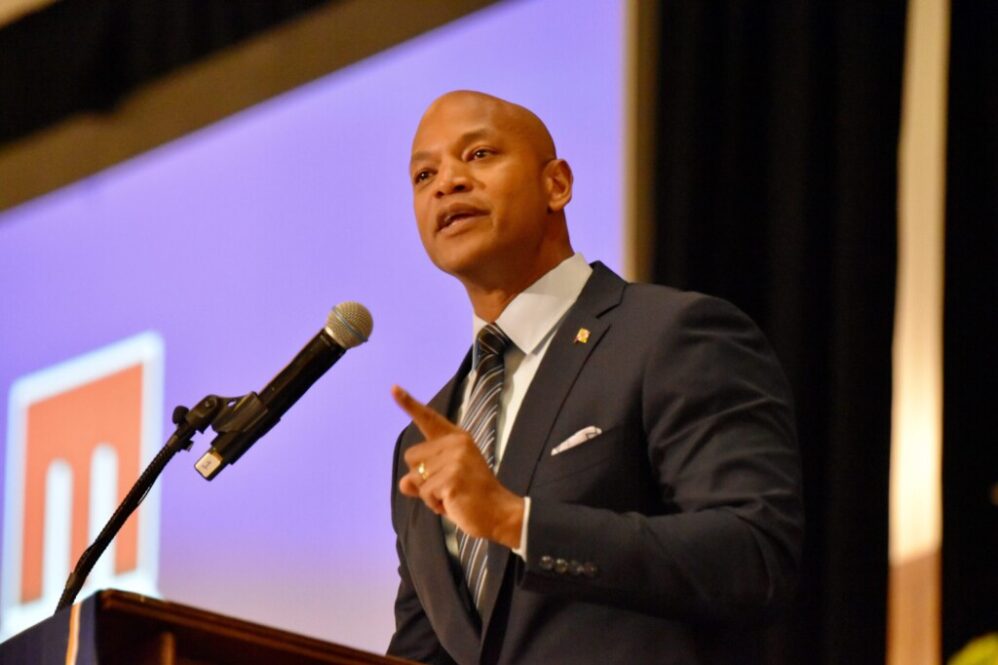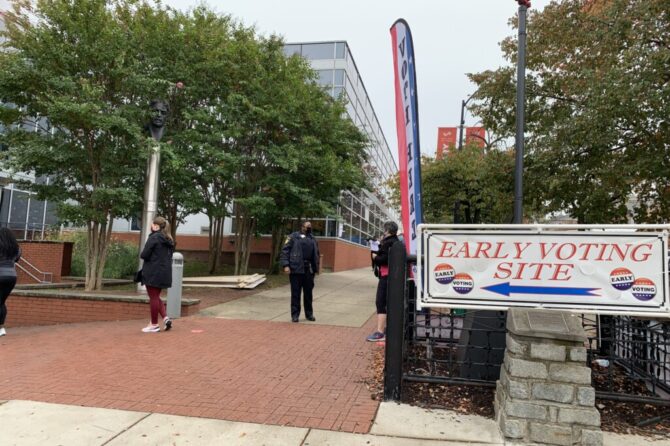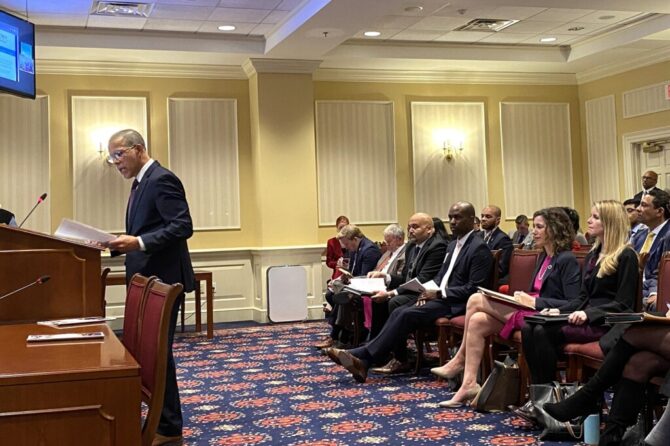MARYLAND MATTERS: Gov. Wes Moore (D) used his second State of the State speech Wednesday to tease a major policy announcement expected for Thursday.
Upon entering office, Moore vowed Maryland would “win the decade,” and in support of that goal, he said he would move quickly to make state “policies as bold as our aspirations.”
Moore touted his pending announcement of an updated plan for state government.
“It’s the first State Plan in nearly a decade,” Moore said in prepared remarks released in advance of the speech. “It doesn’t just set the agenda for the next three months. It will chart the course for the next three years. Our state plan is about more than big aspirational targets. We’ve laid out specific, measurable, actionable, realistic, and time-bound goals. We’ve built these priorities by listening to the people who sent us here: Our constituents.”
The plan is considered an expansion of a comprehensive annual report on state government operations issued by the Department of Budget and Management.
Last September, Moore announced the hiring of Asma Mirsa as his administration’s chief performance officer. Each government agency is expected to be required to send data to her for top state officials to analyze and develop policies.
“Money is important,” Moore said in selected portions of the speech released to reporters Wednesday morning. “But strategy, accountability, and partnership are imperative. We need to spend smarter and wiser across all state programs — in a way that respects the taxpayer, follows data, and responds to the needs of our communities.”
The governor and his staff are planning to roll out the strategy during a Thursday town hall meeting open to more than 40,000 state employees.
Moore’s speech ran 10 minutes longer than expected. At nearly 43 minutes, it was just two minutes shorter than the State of the State address he delivered last year.
‘Happy State of the State’
Before entering the House chamber, Moore walked down the steps from the second floor of the State House toward a few dozen people standing behind ropes in the lobby, who waved and acknowledged the governor.
“Happy State of the State,” he said to gathered onlookers.
Moore took a moment to acknowledge 12-year-old K.J. Lark.
“What’s up?” Moore asked the Crofton Middle School student who was at the State House with other members of the student council from his school.
“It felt pretty amazing. Like he recognized me as a person,” said K.J. “We came on a field trip…to see the State House. This is real life. Stuff is happening here.”
The students didn’t know that their trip was going to coincide with the State of the State address.
Moore entered the House chamber to the same level of the applause as a year ago. But gone were the repeated selfies with lawmakers that delayed his arrival on the rostrum. House Speaker Adrienne A. Jones (D-Baltimore County) had chided him about the delay last year.
From the opening, Moore fell back on the theme of partnership he has broken in since becoming governor.
“Now I know I talk a lot about partnership,” said Moore. “And I know if the state received a nickel for every time I said the word ‘partnership’ we would have all of our budget issues solved. But let’s be clear, partnership is not the goal. Fulfilling the Promise of Maryland is the goal. Partnership is how we’re going to get there.”
Moore benefits from a legislature in which his party holds a supermajority in both the House and Senate.
“We can’t agree on everything, and we won’t,” Moore said. “The truth is, it would be weird if we did. But we can and we will work together to achieve common goals.”
The governor has also reached out to Republicans, including hosting them at a breakfast late last month in the governor’s mansion.
Senate Minority Leader Stephen S. Hershey Jr. (R-Upper Shore) said his party was “fully prepared to work alongside Governor Moore and his administration to seek and find common ground that will advance the interests and welfare of all Marylanders as we embark on this journey of collaboration is also our duty to raise concerns whenever we proceed that actions taken may not be in the best interest of our constituents.”
Hershey, in his party’s response to the governor’s address, described Moore’s goals at various times as bold, ambitious, and lofty, but said they require “much more than grand declarations. It necessitates concrete actions and collaborative efforts.”
Moore, in his first year in office, has rallied supporters to his vision of combating generational issues including the elimination of both childhood poverty and the wealth gap between whites and Blacks.
The state plan Moore will highlight Thursday will be a roadmap to accomplishing some of those goals.
“It will chart the course that we will take for the next three years, and our state plan is about much more than just aspirational targets,” Moore said. “The plan that we are going to lay out it will lay out specific actionable realistic and measurable goals.”
The governor touched on several priorities that were reflected in his recent budget proposal.
“Public safety remains our administration’s top priority and that will not change,” he said.
Earlier this year, Moore announced three bills that make up his public safety package. Topping the list is the creation of the Center for Firearm Violence Prevention and Intervention. The program, to be housed within the Department of Health, would treat firearm violence as a public health issue. Moore has asked for $10 million to establish the center.
Republicans are unlikely to see eye-to-eye with Moore on public safety.
Hershey said Moore’s public safety proposals fall short and described the firearm violence center as “an Obama-Biden scheme.”
“Our vision for Maryland is one where public safety is not just the priority, but the foundation upon which all other aspects of society rest. It is impossible to envision a thriving state without a strong commitment to ensuring that repeat violent offenders are held accountable and that our communities are protected from harm,” Hershey said.
Republicans are backing bills that would increase penalties for violent crimes committed by offenders armed with guns, would make the theft of a gun a felony, and would end so-called good behavior credits for offenders convicted of first- and second-degree murder.
The governor wants to expand victim compensation programs and establish an apprenticeship program to eliminate vacancies in police departments across the state.
Moore’s legislative agenda also includes bills expanding access to affordable housing, aid for entrepreneurs and an expansion of childcare assistance.
“In 2022, Maryland was ranked the seventh most expensive state to live in,” according to the printed version of Moore’s speech. “And that statistic tells a story. It’s the story of the entrepreneur in Hagerstown with a bold idea for a new business, but who doesn’t have the money to make rent this month — let alone start a company. It’s the story of a single mom in Leonardtown who works multiple jobs just to put food on the table. This year, we will address two big items on every family budget: Housing and childcare.”
GOP warns of ‘tax heists’
Moore entered office a year ago on a wave of optimism as the state’s first Black governor. He promised quick, bold actions for state government.
Since then, the tenor has changed.
Moore has found some promises, such as filling half of the estimated 10,000 vacant jobs in state government in his first year, easier made than fulfilled.
The governor spent the better part of his first year rarely saying no.
By August, he began hinting at a coming retrenchment of state government.
By January, Moore, avoiding use of the phrase budget cuts, announced some programs would be “rebased” to pre-pandemic funding levels.
Some stakeholders warn that the possibility of tax hikes could impede Moore’s aspirations for expanding economic opportunity in the state.
“The small business community is ready to partner with the Governor, his administration, and the General Assembly on making Maryland the best place to start and run a business,” said Mike O’Halloran, state director for the National Federation of Independent Business. “But we have to be honest on what it will cost Marylanders to fund the programs that are adding billions of dollars to our structural deficit. Small business owners do not have a choice. They must operate within their means or rethink how they do business. They expect policy makers to do the same. And do it without resorting to tax hikes on them and their customers.”
The state now faces mounting structural budget deficits that quickly approach $3 billion in coming years. And while Moore staved off initial cuts to transportation, local and state leaders are facing more than $3.1 billion in cuts without new ways to pay for road and transit projects.
Much of the state’s growing operational budget shortfalls are the result of growing costs of the educational reforms known as the Blueprint for Maryland’s Future.
“Democrat legislators are now proposing an omnibus tax increase proposal that would raise taxes on job-creating corporations, raise the state’s so-called death tax and increase the capital gains taxes,” Hershey said. “Even if these tax heists were passed, this $1.6 billion annual projection does not incorporate how much revenue would be lost from individuals, businesses and jobs, leaving the state as a result of them.”
The tax bill highlighted by Hershey is likely to stall in the Senate this year. Even so, Republicans warn that a reprieve on tax increases is temporary.
Moore’s speech offered an acknowledgement that his honeymoon is over, and he is no longer the newcomer he was a year ago.
“I’m proud of what we’re doing. But I’m most proud of how we’re doing it,” Moore said in the excerpt. “The executive and the legislature are working together again. We chose to sweat the details of governing, knowing that our constituents deserve nothing less. And by moving in partnership, we’ve helped make life better for the people we serve.”
The governor received praise from other Democrats, including Prince George’s County Executive Angela Alsobrooks (D). She was one of several county executives who sat inside the House chamber to hear Moore’s remarks, and was especially pleased that he spotlighted the future FBI headquarters relocating from Washington, D.C., to her jurisdiction, the second largest in Maryland.
“I think that is one of the single, largest economic accomplishments that we have seen in Maryland in many, many years. The impact of it cannot be overstated,” Alsobrooks said. “It will literally give a boost to our economy [with] 7,500 jobs, cybersecurity and technology jobs.”
Moore’s words also were emotional for Del. Vanessa Atterbeary (D-Howard), who he personally mentioned — along with a handful of other lawmakers — in his speech.
Atterbeary connected the governor with Elizabeth Clayborne, a medical doctor and an adjunct professor at the University of Maryland School of Medicine, who Moore singled out during his speech for her entrepreneurial achievements. Both Clayborne and Atterbeary are African American single mothers.
“I can just relate,” Atterbeary said. “I just felt an incredible sense of pride to be able to help people and to have him recognize it was pretty amazing.”












